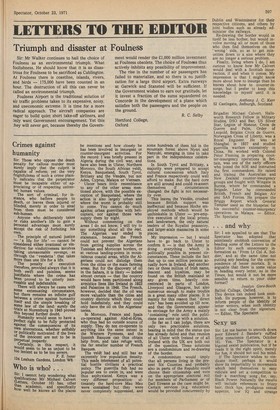Who is who? . . .
Sir: I cannot help wondering what qualifications Mr Michael Calvert (Letters, October 16) has, other than academic, and specifically how well he knows all the places he mentions and how closely he has been involved in insurgent or counter-insurgent activities. For the record: I was briefly present in Algeria during the civil war, and have also been in Ulster, Northern Morocco, the South African veldt, Kenya, Basqueland, South Tyrol, Brittany and the Vendee, but not Aden, Cyprus, Malaya or Vietnam.
• Ulster bears little resemblance to any of the other areas mentioned above, with the possible exception of Basqueland, where the action is also largely urban and where the worst is probably still to come. You cannot do much against urban guerrillas with helicopters, nor against those who supply them by night. Without commenting on the areas I do not know, I will try to say something about all the rest. The Algerian war ended in stalemate, because the French could not prevent the Algerians from getting supplies across the Tunisian and Moroccan borders, or at various landing-points in mountainous coastal areas, while the Algerians could not dislodge them from the cities or the main farming areas. But for the discovery of oil in the Sahara, it is likely — indeed almost certain — that the country would have been partitioned along armistice lines like Ireland in 1922 and Palestine in 1948. The French, however, decided that the oil was more valuable than the cities and country districts which they could hold indefinitely, and they could only have the oil on the Algerians' terms.
In Morocco, France and Spain co-operated against Abd-el-Krim, who thus had no outside source of supply, They do not co-operate to anything like the same extent in the Western Pyrenees, and the Spanish Basques can thus obtain help from, and take refuge with, the far smaller number of French Basques.
The veldt had and still has an extremely low population density. This made internment of all potential hostile civilians a practical policy. The guerrilla fish had no popular sea to swim in, and were thus asphyxiated. Kenya was a very different proposition: ultimately the hard-core Mau Mau were contained but they were never completely suppressed, and some hundreds of them hid in the mountain forest above Nyeri and Nanyuki, emerging in time to take part in the independence celebrations.
In South Tyrol and Brittany, a majority were prepared to accept cultural concessions which Italy and France respectively could well afford to make. But the hard core are still around and could re-assert themselves if circumstances changed: the fight is not necessarily over. This leaves the Vendee, crushed because British support was ineffectual and because Hoche employed methods which would be unthinkable in Ulster — pre-emptive execution of the local priests and landowners, the only natural leaders of the Royalist peasantry, and larger-scale massacres in some places.
My impression — but I would have to go back to Ulster to confirm it — is that the Army is doing everything which is politically possible in present circumstances. These include the fact that up to one million persons actually born in Ireland, and another two or three million of Irish name, descent and loyalties, may be found on the British mainland at any given time, heavily concentrated in parts of London, Liverpool and Glasgow, but also numerous enough to make trouble in a great many other places. It is mainly for this reason that direct rule' has been avoided up till now, and that the Government appear to envisage for the Army a mainly ' containing ' role until the politicians can come up with a solution.
So far as I can judge, there are only two practicable solutions, bearing in mind that the status quo has already failed and that reunion of all Ulster with Ireland or of all Ireland with the UK are both out of the question. These solutions are a condominium and re-drawing of the border.
A condominium would imply that all persons living in the present Six Counties and probably also in parts of the Republic could choose their citizenship and vote on the appropriate electoral roll for members of Parliament or of Dail Eireann as the case might be. Certain services (e.g. education) would be provided concurrently by
Dublin and Westminster for their respective citizens, and others by joint bodies such as already administer the railways.
Re-drawing the border would in itself be less bother, but would involve moving all or most of those who then find themselves on the ' wrong' side, so as to get minorities down to a size where they are no longer a serious problem.
Finally, living where I do, I am curious to know how Mr Calvert would deal with a Scottish insurrection, if and when it comes. My impression is that I might know more about how to insurge than he knows about how to counter-insurge, but I prefer to keep this knowledge to myself until it is needed.
Anthony J. C. Kerr 52 Castlegate, Jedburgh, Scotland Brigadier Michael Calvert, Hallsworth Research Fellow in Military Studies, DSO and Bar, US Silver Star, Legion of Honour, Croix de Guerre and Palm, Order of Leopold, Belgian Croix de Guerre, Norwegian Cross of Liberty, was a Royal Engineer. He was at Shanghai in 1937 and studied guerrilla warfare extensively in China. He worked with Colonel Peter Fleming in preparing counter-insurgency operations in Britain, was one of the early officers who joined the SOE and instructed the first commandoes. He raised and trained the Australian and New Zealand counter-insurgency groups and fought with Wingate in Burma, where he commanded a Brigade. Later he commanded British, French and Belgian Air ana SAS Forces. He prepare the Briggs Report which General Templar used as the blueprint for his successful counter-insurgency operations in Malaya. — Editor, The Spectator


































 Previous page
Previous page